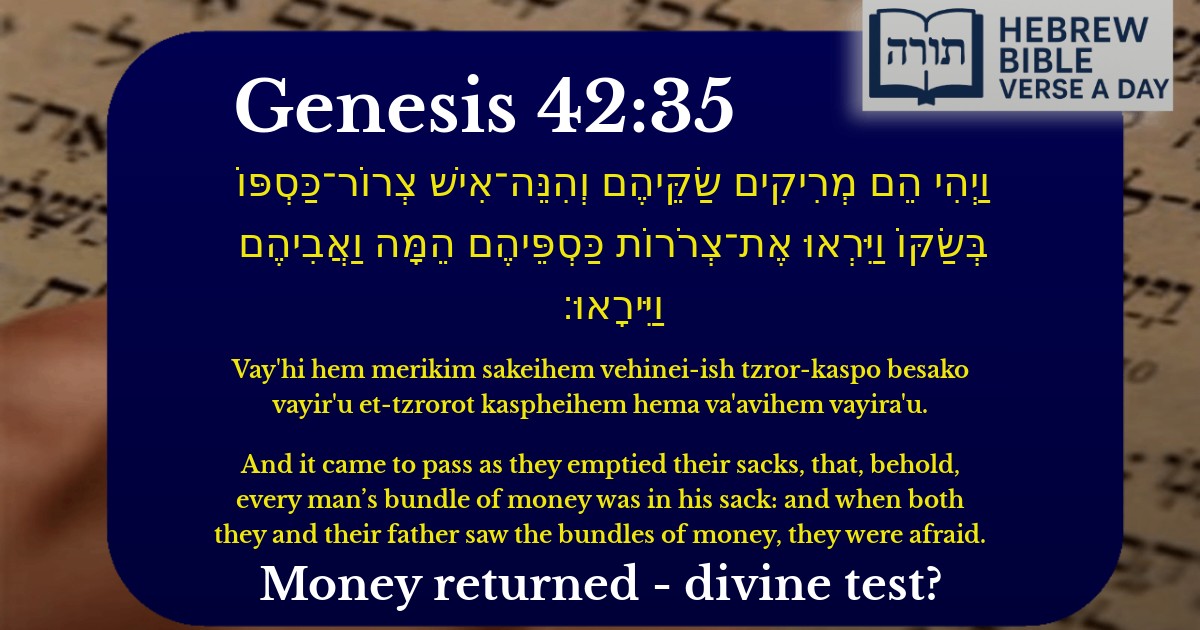Join Our Newsletter To Be Informed When New Videos Are Posted
Join the thousands of fellow Studends who rely on our videos to learn how to read the bible in Hebrew for free!
Hebrew Text
וַיְהִי הֵם מְרִיקִים שַׂקֵּיהֶם וְהִנֵּה־אִישׁ צְרוֹר־כַּסְפּוֹ בְּשַׂקּוֹ וַיִּרְאוּ אֶת־צְרֹרוֹת כַּסְפֵּיהֶם הֵמָּה וַאֲבִיהֶם וַיִּירָאוּ׃
English Translation
And it came to pass as they emptied their sacks, that, behold, every man’s bundle of money was in his sack: and when both they and their father saw the bundles of money, they were afraid.
Transliteration
Vay'hi hem merikim sakeihem vehinei-ish tzror-kaspo besako vayir'u et-tzrorot kaspheihem hema va'avihem vayira'u.
Hebrew Leining Text
וַיְהִ֗י הֵ֚ם מְרִיקִ֣ים שַׂקֵּיהֶ֔ם וְהִנֵּה־אִ֥ישׁ צְרוֹר־כַּסְפּ֖וֹ בְּשַׂקּ֑וֹ וַיִּרְא֞וּ אֶת־צְרֹר֧וֹת כַּסְפֵּיהֶ֛ם הֵ֥מָּה וַאֲבִיהֶ֖ם וַיִּירָֽאוּ׃
וַיְהִ֗י הֵ֚ם מְרִיקִ֣ים שַׂקֵּיהֶ֔ם וְהִנֵּה־אִ֥ישׁ צְרוֹר־כַּסְפּ֖וֹ בְּשַׂקּ֑וֹ וַיִּרְא֞וּ אֶת־צְרֹר֧וֹת כַּסְפֵּיהֶ֛ם הֵ֥מָּה וַאֲבִיהֶ֖ם וַיִּירָֽאוּ׃
🎵 Listen to leining
Parasha Commentary
📚 Talmud Citations
This verse is quoted in the Talmud.
📖 Chullin 91a
The verse is referenced in the context of discussing the fear and surprise of Joseph's brothers when they found their money returned in their sacks, illustrating divine providence and human emotions.


Context of the Verse
This verse (Bereshit 42:35) describes the moment when Yosef's brothers return to their father Yaakov after their first journey to Egypt. Upon emptying their sacks, they discover that the money they had used to purchase grain had been returned to them, causing them and their father great fear. This event is part of the larger narrative of Yosef testing his brothers to see if they had repented for selling him into slavery.
Rashi's Explanation
Rashi explains that the brothers' fear stemmed from two concerns:
Midrashic Insights
The Midrash (Bereshit Rabbah 91:10) elaborates on their fear, stating that Yaakov interpreted this event as a sign of further tragedy. Having already lost Yosef and Shimon (who was detained in Egypt), he feared that this was the beginning of more suffering. The Midrash compares this to the verse in Tehillim (76:9), "The earth feared and was still," suggesting that their fear was a prelude to divine judgment.
Rambam's Perspective
While Rambam does not comment directly on this verse, his principles in Hilchot Teshuva (Laws of Repentance) shed light on the brothers' reaction. Their fear indicates an awareness of their past wrongdoing and a recognition that unusual events may be divine messages calling them to introspection and repentance.
Ibn Ezra's Analysis
Ibn Ezra notes that the phrase "they were afraid" applies both to the brothers and Yaakov, but for different reasons:
Chizkuni's Additional Insight
Chizkuni points out that the double language of "their bundles of money" emphasizes that each brother found his exact payment returned, making it clearly intentional rather than accidental. This precision heightened their anxiety about the situation's supernatural nature.